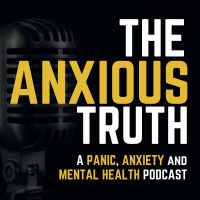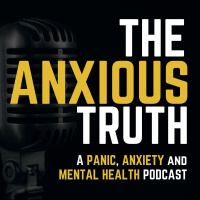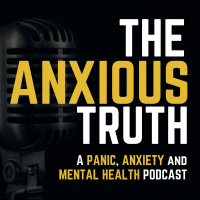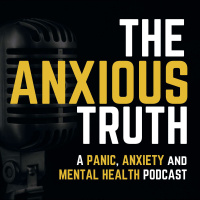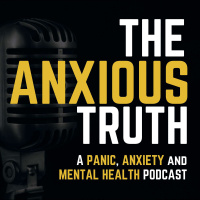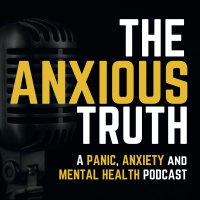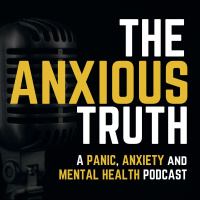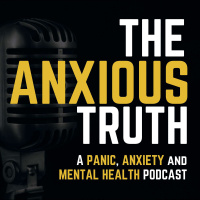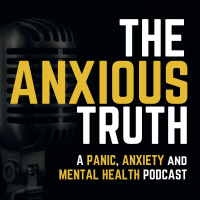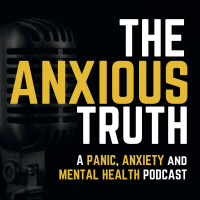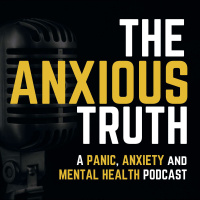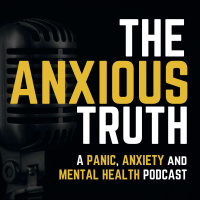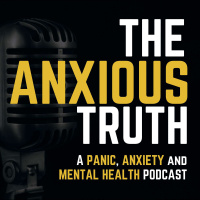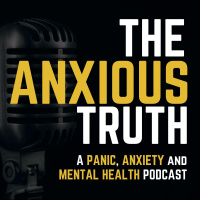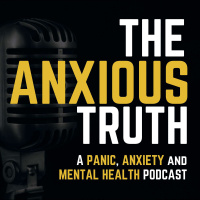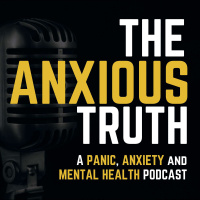Synopsis
Straight Talk and Help For Anxiety Panic and Agoraphobia
Episodes
-
EP 0104 - Health Anxiety and Uncertainty With Dr. Ingvard Wilhemsen
23/04/2020 Duration: 29minSend in a question or comment via text.Today I was fortunate to have spent 25 minutes on a Zoom call with Dr. Ingvard Wilhemsen, a respected expert in the field of health anxiety and hypochondriasis from the University of Bergen in Norway. We discussed the basis of health anxiety, what drives it, the underlying principles of uncertainty and safety, and some of the effective methods he uses when treating patients with health anxiety.Dr Willhemsen has been kind enough to offer to do a follow-up episode with us, so if you have questions or comments, please follow the links to any of my social media channels. Feel free to reach out with whatever questions you might have and I'll do my best to get them answered in a coming episode.To learn more about Dr. Wilhelmsen or any of his work, you can Google him here.My Linkshttps://theanxioustruth.com/linksSupport The Anxious Truth: If you find the podcast helpful and want to support my work, you can buy me a coffee. This is never required, but always appreciated!D
-
EP 0103 - You Don't Have to Feel OK To Be OK
15/04/2020 Duration: 26minSend in a question or comment via text.Inspired by a post I made on Instagram, here's 25 minutes or so on the difference between feeling OK and actually being OK. The highlights: Your anxiety disorder has you in the bad habit of scanning and evaluating your state all the time Your anxiety disorder has you interpreting how you feel through a distorted lens of fear and misguided threat assessment You then make the mistake of nailing your assessment of how you FEEL, so your assessment of what you are capable of doingYou do not have to feel OK, to be OK. You must be aware of the scanning and evaluating habit, and you must be aware of the mistake of equating how you feel to what you are capable of doing. You must ACT even when feeling less than OK. You must show yourself through experience that thinking that you are not OK is incorrect, and that you are able to manage and live a normal day even when feeling badly. The experience of doing this repeatedly will help eliminate the mistake you have been makin
-
EP 0102 - Fear Of Insanity Or Going Crazy
01/04/2020 Duration: 34minSend in a question or comment via text.For full show notes on this episode: https://theanxioustruth.com/102One of the two most common fears of anxiety and panic sufferers is the fear of going insane. Losing one's mind. Going crazy. Many worry that they will "lose it", or "snap" when at the height of panic or extreme anxiety. This is a difficult fear to face, but it remains an irrational fear that never comes true.The fear of going insane or losing one's mind is no different than the fear of dying, or passing out, or vomiting, or anything else. The fear that you may lose your mind because of anxiety and panic is just another in the long line of irrational, distorted, magnified fears that come along with anxiety disorders. Your catastrophe (going insane) is not special and does not warrant any special approach or technique to address.Episode Topics: There Is No "Sanity Control" To Worry About Anxiety and Panic Are Not Equal To Severe Trauma You Have Not Kept You
-
EP 0101 - The Selfish Nature of Anxiety and Fear
25/03/2020 Duration: 28minSend in a question or comment via text.For full show notes on this episode, go to https://theanxiousgroup.com/101Anxiety disorders are selfish disorders. Anxiety and fear are self-centered and will push their way to the front of the line at all times. When struggling with an anxiety disorder, the selfish nature of the disorder often makes you look selfish and self-centered. The disorder is selfish. You are not. Anxiety and fear drive self-centered behaviors in three ways:Disruption Based on AvoidanceAnxiety causes you to spend your time scanning for threats. Every situation is evaluated based on how it may make you feel. Decisions are made based on the drive to avoid the feelings and thoughts that you hate and fear. When your anxiety drives you to cancel engagements, avoid places and situations, and flee from discomfort, the change in your lifestyle impacts the people around you .... Becoming The Center of The UniverseAnxiety and fear will drive you focus on yourself continuously. In any given situatio
-
EP 0100 - Learning To Believe In Yourself
18/03/2020 Duration: 35minSend in a question or comment via text.My friend Kendra Beavis has an amazing story. This is a story about making major life changes, solving life problems, and become a better version of yourself. So much of this is based on belief. Belief in yourself, and belief in your ability to do hard things and make changes.We can't just choose change. We can't just decide to believe in ourselves and be instantly confident. Often we must take action to make the changes we want in our life even before we are confident taking action. Meaningful progress and change isn't something you may believe you are capable right now, but that's OK.You don't get to be confident, and you don't get to believe in yourself by waving a magic wand. Belief and confidence are things we learn through action and experience. Belief and confidence are earned by doing the hard or scary things you might not think you can do. When we make the choice to move ahead even though you don't feel ready, amazing thi
-
EP 0099 - The Habit Of Words
11/03/2020 Duration: 38minSend in a question or comment via text.For full show notes on this episode: https://theanxioustruth.com/99We naturally develop habits with respect to the way we talk about, think about, and write about our anxiety problems. This is the habit of words, and it matters. Identifying unhealthy and counterproductive habits of words, then working to replace them with more recovery-focused habits is well worth the effort.The most common habit of words is the habit of constantly saying how you feel, what you're afraid of, and how much you hate it all. This is the habit that most people in the grips of an anxiety disorder naturally develop. This is a bad habit. Constantly talking about, thinking about, and writing about what you feel is a form of safety and reassurance seeking. This is bad because it reinforces the mistaken cognitive connection between discomfort and fear. If you are spending an inordinate amount of time telling people what you're feeling and experiencing in a passive way, you are hoping
-
EP 0098 - STOP Checking In With Yourself!
04/03/2020 Duration: 25minSend in a question or comment via text.Full show notes for this episode are at https://theanxioustruth.com/98Telling someone in the grips of a raging anxiety disorder to "check in with themselves" is a TERRIBLE bit of advice. If you are in the grips of a ranging anxiety disorder - finding it near impossible to STOP thinking about how you feel all the time - it's OK to reject this advice.While in the grips of raging disorders like OCD, health anxiety, panic disorder, and agoraphobia, specifically making time to focus inward on how one is feeling is like pouring gasoline on a fire. A person that is desperate to STOP paying constant attention to how they feel and what they think does not need to turn inward to see what they need. What they need is to stop focusing inward. The inward focus is driving their problem. Telling this person that they need to check in with themselves to see how they're feeling is like telling an inmate to escape from prison by running back into the cell block.
-
EP 0097 - Anxiety and Abusive/Controlling Relationships (w/Long Island Against Domestic Violence)
26/02/2020 Duration: 29minSend in a question or comment via text.Full show notes for this episode can be found at https://theanxioustruth.com/97Being in an abusive or controlling relationship is difficult for anyone. Struggling with an anxiety disorder complicates things, making the situation even more difficult to handle. Statistics show that 1 in 3 women, and 1 in 4 men, will be involved in an abusive relationship at one point in their lives. This is a problem in the general population. My experience in the anxiety disorders community leads be to believe that it is even more prevalent among people suffering from anxiety problems. Today I was joined by Colleen Merlo and Wendy Linsalata of Long Island Against Domestic Violence. Colleen and Wendy were kind enough to give their time to discuss the problem and answer questions posed in my Facebook group.Resources: National Domestic Violence Hotline (United States): 1-800-799-7233 National Domestic Violence Hotline web site: https://thehotline.org Long Island Against Domestic Viole
-
EP 0096 - Addressing Perfectionism w/Dr Tara Sanderson
19/02/2020 Duration: 28minSend in a question or comment via text.For full show notes on this episode, visit https://theanxioustruth.com/96Perfectionism. It's a label I hear frequently self-applied by many going through the process of recovering from an anxiety disorder. Labeling oneself as a perfectionist results in challenges that make recovery more difficult than it has to be.Today I was able to spend time with Dr. Tara Sanderson, a licensed doctoral level psychologist practicing in Oregon. Tara not only specializes in behaviorally oriented therapies for anxiety issues, but she has experienced the "curse" of perfectionism in her own life and has written a book on the topic.Changing and challenging perfectionism requires an understanding of why you may be labeling yourself that way and attempting to make everything right and perfect in the world. Are you bolstering your self-image by wearing perfectionism as a badge of honor? Are you convinced that making everything perfect will make life better or easier? In bot
-
EP 0095: Anxiety Success Story - Martine Changes Direction
12/02/2020 Duration: 20minSend in a question or comment via text.For full show notes on this episode, visit https://theanxioustruth.com/95Just six months ago, Martine was experimenting with medication, housebound most of the time, and considering hospitalization to deal with her anxiety problem. Today she is working, participating with her family, living a normal life, and looking forward to what comes next. Today Martine took some time to chat with me about how she changed direction and took control of the situation. Where once Martine has no direction and no plan for recovery, everything changed when she decided to start doing things she was afraid to do. Through repetition and incremental progress, everything changed. Her message? “Don’t give up. It will get better!”Truer words were never spoken. Thanks, Martine, for taking the time so share your story.Join my Facebook group and get involved in the discussion:https://facebook.com/groups/TAGForumMy website and all social links:https://theanxioustruth.com/linksIntro and outro
-
EP 0093 - Dizziness and Unsteadiness Due To Anxiety
29/01/2020 Duration: 20minSend in a question or comment via text.For the full show notes on this episode including a link to the diaphragmatic breathing video I mentioned:https://theanxioustruth.com/93For many people, feeling dizzy or unsteady is one of the most enduring and difficult to deal with anxiety symptoms. If you areThere are two main steps in dealing with dizziness and unsteadiness:1. Change the way you think about and talk about this sensation. This isn't true physically debilitating dizziness that makes you literally unable to stand upright. This sensation is simply a feeling of visual and physical discomfort when moving through space. You are uncomfortable when moving, but you are still able to move through space and function without impairment. Being uncomfortable isn't ideal, but start to embrace the difference between incapacitated and uncomfortable. They are not equal. You are unsteady, which is uncomfortable for you, and you are likely reacting in fear to that discomfort. When think about this issue,
-
EP 0092 - Monophobia (Fear Of Being Alone)
22/01/2020 Duration: 20minSend in a question or comment via text.Monophobia - the fear of being alone - is a common component of the panic, anxiety and agoraphobia complex. When left unchecked, panic disorder leads to agoraphobia. When this happens, monophobia often develops at the same time. If your coping mechanisms rely heavily on a "safe" person, or safe people, then you are more likely to develop monophobia. Monophobics expend a great deal of effort and energy in an attempt to never be alone. This can be VERY disruptive and impactful when it comes to daily life, and relationships with those people designated as safe or rescue people. Monophobia is not a different or special kind of problem. It's simply your fear of anxiety and related symptoms expressed in a given context - being alone and out of reach of your safe or rescue people. This is simply the mistaken belief that you need someone to safe you from panic and its related sensations. When deprived of that rescuer or rescuers, the monophobic perceives
-
EP 0091 - Worry and Worrying
15/01/2020 Duration: 25minSend in a question or comment via text.Worry and worrying are problems that many people struggle with along road to recovering from an anxiety disorder. I'm asked to cover this topic again and again. So ... a few words about worry and worrying.Full notes for this episode can be found at https://theanxioustruth.com/91Worry is simply thinking. Thinking by itself has absolutely no impact on the real world. Worry, therefore is not protective, predictive or proactive. Worry does not keep you safe from disaster. It does not keep bad things from happening. It does not prepare you for when they do. Worry is just thinking, and its not terribly useful.Worry is related to planning. Planning is thinking accompanied by action. When planning, we take our thoughts and transform them into real world actions required to respond to and react to real world events. Planning is useful. Planning is helpful. We all plan in some way. Worry, on the other hand, is thinking WITHOUT action. Worry is half a plan and has
-
EP 0090 - What If It Comes Back? Examining The "Acceptable Bubble"
08/01/2020 Duration: 23minSend in a question or comment via text.One of the common worries while recovering from an anxiety disorder is the fear that it might "come back" after recovery. This is something I hear from many many people. It's also pretty common in the community surrounding the podcast to see people arrive that have been through these issues before. They thought had it all solved, but find themselves back in the grips of panic, anxiety and associated nastiness.The Acceptable Bubble - What Is It?This is closely related to what I've been calling the "acceptable bubble". This is the bubble we build when we do the "recovery things", but we engineer them to do them without anxiety. Often this means that someone has found a panic-free way to do all the required basic life things, then kinda stopped doing the work. The hallmark of the "acceptable bubble" is the existence of limits and limitations in one's life.What Are The Signs Of An Acceptable Bubble?If you feel like
-
EP 0089 - Breath and Breathing Centered Anxiety
01/01/2020 Duration: 29minSend in a question or comment via text."What if I forget how to breathe?""What if I just stop breathing?""I can't get enough air in my lungs.""I can't take a deep breath."Breath and breathing focused anxiety is quite common among people that suffer from anxiety disorders like panic disorder and agoraphobia. In this episode I discuss the two most common forms of this anxiety.For full show notes: https://theanxioustruth.com/89[1:30] "I Am Afraid That I Will Forget How To Breathe"The first is an obsession with the thought that you have to actively, manually breathe, or your body will somehow forget to breathe or you will stop breathing. This obsessive, irrational thought may grip you during every waking moment, tricking you into thinking that you must stay involved in the process of breathing to avoid some horrible fate.[12:19] "It Feels Like I Can't Breathe. I Can't Take a Deep Breath!"This is the second common form of breath and
-
EP 0088 - Anxiety Success Stories : Joyce Gets Angry ... And Gets Better!
26/12/2019 Duration: 24minSend in a question or comment via text.My friend Joyce joined me to talk about her slide into severe panic disorder and agoraphobia, which was followed by an aggressive recovery and rebuilding of her life. Listen to Joyce describe her journey from being frozen in fear on her sofa to being back at work and feeling limitless. Of particular note is the way Joyce used anger and frustration to fuel her recovery efforts. For many, this can be an excellent strategy and I really appreciate Joyce being so open and honest about how she was feeling and how it helped to propel her forward. As always, comments and questions are welcomed. I will do my best to relay any questions or messages to Joyce as they are asked.My Links (website, podcast, social. mailing list, etc.)----------------------https://theanxioustruth.com/linksSupport The Anxious Truth: If you find the podcast helpful and want to support my work, you can buy me a coffee. This is never required, but always appreciated!Disclaimer: The Anxious Truth is not
-
EP 0087 - Being Yourself Again : Hope and Help For Your Nerves Chapter 9
23/12/2019 Duration: 54minSend in a question or comment via text.Holly and I discuss chapter 9 of Claire Weekes' "Hope And Help For Your Nerves". This chapter discusses the nature of recovery and the road to being yourself again. Some of the highlights: Your symptoms will not immediately go away, and may even worsen during recovery. You cannot simply decide to not be afraid. You must LEARN to not be afraid. We discuss the use of medication in conjunction with recovery. Keeping occupied - not being wholly consumed at all times with recovery - is essential. Quick recovery is possible and does happen for some people. A big part of recovery is understanding that what you think is keeping you stuck. Setbacks can and likely will happen, but they're not really setbacks if you frame them properly and learn from them.You can buy Hope and Help From Your Nerves by following the Amazon links from my website:https://theanxioustruth.com/shop/ Join The Discussion Group——————————————–https://facebook.com/groups/TAGForumMy Lin
-
EP 0086 - Stop Arguing With Your Anxiety and Trauma (w/Joe Ryan)
14/12/2019 Duration: 39minSend in a question or comment via text.When confronted with uncomfortable and scary feelings of anxiety, panic or emotions based on past trauma, the immediate response is to "talk yourself down". Trying convince yourself that you are OK using words, phrases and thoughts often does not work. When this happens, you are at a fork in the road. You can enlist the aid of your support system to argue with your anxiety or trauma for you, or you can resign yourself to just feel everything without resistance to let it pass through you and end naturally.Spoiler alert ... you want option two. Facing and accepting anxiety, panic, and feelings based on your past is harder, but its the path that leads to long term change and lasting recovery. Continuing to argue, or using your support team to argue by proxy for you, may be an attractive option because it's the "easier" option and may seem like the fast path to feeling better in the moment, but there's no learning or changing to found there
-
EP 0085 - Heart Anxiety Issues and Interoceptive Exposure
06/12/2019 Duration: 33minSend in a question or comment via text.If you are a regular listener of the podcast, odds are that you've had anxiety, worry and fear focused on your heart at least once or twice. This is quite common. Heart-centered anxiety generally involves being afraid of a rapid, strong, or irregular (flutters/palpitations) heartbeat. This is either due to an underlying fear that something is wrong with your heart or will go wrong, or due to the link between a rapid/strong heartbeat and a panic attack. In either case, the way out, as always, is through. We can use interoceptive exposure techniques to intentionally create the rapid or strong heartbeat we fear in order to desensitize and learn that there is no reason to fear your heartbeat. Yes, this involves intentionally experiencing that which you fear, but this is almost always the case when solving these problems.Comments and questions always welcomed.Find this episode on my website:https://theanxioustruth.com/85My Links:https://theanxioustruth.com/linksMus
-
EP 0084 - Anxiety and Autism/Neurodiversity Issues w/Christa Holmans
26/11/2019 Duration: 39minSend in a question or comment via text.Today I chatted with Christa Holmans about some of the overlapping issues found in both anxiety disorders and autism and other neurodivesity conditions such as ADHD. Christa had so much excellent insight on how autism influences how one may deal with anxiety issues! I really enjoyed this discussion and I hope you will too!My Links (Website, podcast, social media, etc.)---------------------https://theanxioustruth.com/linksFind Christa Online-----------------------https://neurodivergentrebel.comSupport The Anxious Truth: If you find the podcast helpful and want to support my work, you can buy me a coffee. This is never required, but always appreciated!Disclaimer: The Anxious Truth is not therapy or a replacement for therapy. Listening to The Anxious Truth does not create a therapeutic relationship between you and the host or guests of the podcast. Information here is provided for psychoeducational purposes. As always, when you have questions about your own well-being, pl

